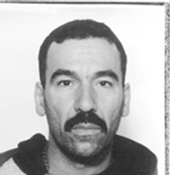Staten Is. man will serve at least 65 years in two New Jersey murders; suspect in others
A New Jersey judge sentenced Richard W. Rogers, a gay man from Staten Island, to what is effectively a life sentence after he was found guilty in the 1992 killing of Thomas R. Mulcahy and the 1993 slaying of Anthony E. Marrero.
“It’s the maximum sentence that is permitted under New Jersey law for the crime that he was found guilty of,” William J. Heisler, the executive assistant prosecutor in the Ocean County Prosecutor’s Office, who handled the case, told Gay City News.
The verdict had come on November 10 after a four-week trial, but sentencing happened only last week.
On January 27, James N. Citta, the New Jersey Superior Court judge who presided over the case, gave Rogers a 30-years-to-life sentence for murder with another two-and-a-half year minimum for hindering apprehension in the Mulcahy slaying. Citta gave Rogers the same penalty in the Marrero killing.
The judge required that Rogers serve all four sentences consecutively. Rogers, 55, will have to serve a minimum of 65 years before he is eligible for parole.
The Associated Press reported that Citta called Rogers “an evil human being” and expressed the hope that he die “in some hole in some prison without ever having freedom again.” Citta concluded by saying, “That’s the judgment of this court… We’re done. Take him out of here,” the AP reported
The remains of the 57-year-old Mulcahy, a businessman from Sudbury, Massachusetts known to visit gay bars when in New York, were found in two locations in New Jersey as were the remains of the 44-year-old Marrero, also known to be gay. Both men had been carefully dismembered and wrapped in plastic bags. Rogers’ fingerprints were found on the bags holding the remains of both men.
The murder cases went unsolved until 2000 when a 14-member task force that included investigators from the New Jersey State Police, Ocean County, and New York’s Rockland County re-opened the case. New technology was used to identify the fingerprints on the plastic trash bags and matched against fingerprints from Rogers taken when he was tried but acquitted in Maine of the 1973 murder of 22-year-old Frederic Spencer.
Citta allowed the prosecution to present evidence during the trial on two out-of-state murders that Rogers was not charged with but for which he is a suspect, based on key similarities between those killings and the Mulcahy and Marrero slayings. The jury saw evidence in the killings of Michael Sakara, 55, whose remains were found in New York in 1993, and Peter Anderson, 54, whose body was found in Pennsylvania in 1991.
Citta did not allow evidence of the 1982 murder of Matthew John Pierro, 25, in Florida, to be introduced. Pierro was found with ligature marks on his neck, indicating he had been strangled, and multiple stab wounds to his body. Rogers is considered a prime suspect.
Sakara, but not Anderson, had been dismembered in a way that matched the Marrero and Mulcahy dismemberments. Rogers’ fingerprints were found on the bags that held Anderson’s body, but not on the bags that held Sakara’s remains. A witness saw Sakara and Rogers together in a Greenwich Village bar hours before Sakara’s body was found.

Police never determined where the Mulcahy and Marrero killings took place and that will be an issue for Rogers’ appeal, David A. Ruhnke, Rogers’ attorney, told the AP. In order to convict Rogers, the jury was required to make a finding of fact that the murders took place in New Jersey.
Ruhnke told Gay City News in an earlier interview that the evidence on the Sakara and Anderson killings would also be an issue on appeal. That evidence tended to represent Rogers as a serial killer. The concern was that the jury would convict him on that basis and not on the Mulcahy and Marrero evidence.
“I think that’s exactly the message that the evidence sent and that the jury received, “ Ruhnke told Gay City News. “I think that was an enormously prejudicial decision by the judge and whether he was legally correct in making it is going to one of the primary appellate issues.”
Ruhnke has already filed notice of appeal in the case.
“We expect that in every case where there is a conviction,” Heisler said. “It’s routine.”
The New York City gay and Lesbian Anti-Violence Project welcomed the sentence.
“This is kind of a completion of a long struggle for two of the victim’s families,” said Clarence Patton, executive director of the gay victims group. “We don’t want to pile on, but what we would like to see is some of these additional cases get adjudicated so those families can get some measure of closure.”
Richard Rogers (left), a gay man from Staten Island, has been sentenced to what is essentially a life sentence in the murders of Thomas R. Mulcahy (center) and Anthony E. Marrero, whose dismembered bodies were found in New Jersey in the early ‘90s.
gaycitynews.com



































